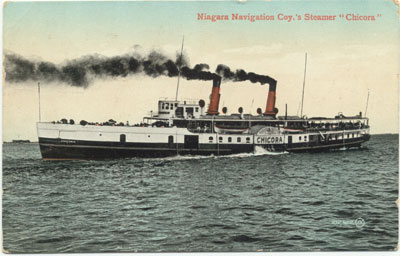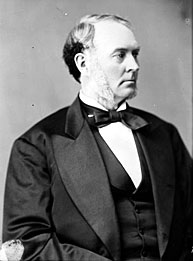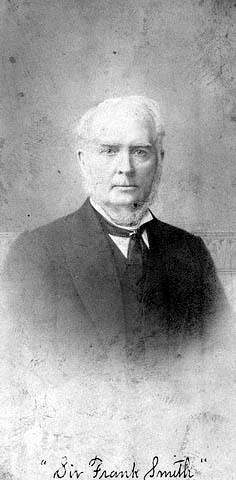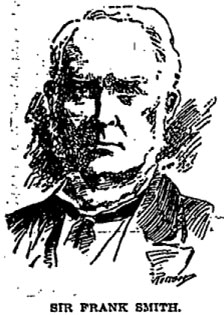The Man who would have been Prime Minister
Frank Smith’s life is the Canadian rags to riches immigrant boy makes good story.
There is a superb biography of Sir Frank by Mark McGowan at the Dictionary of Canadian Biography Online. It is a great read and any attempt by me to improve on it would be fruitless. What I did want to highlight here were a few of the more overarching aspects to Sir Frank’s career and how it reflected the nature of the collision between politics and business of the time.
I would however contribute the following family tree to McGowan’s presentation along with accompanying photographs.

Business
There are aspects of McGowan’s biography that hint at some of the more salient aspects of Smith’s career.
One of the intriguing turns of phrase that McGowan concerns what he terms Macdonald’s temporary loss of confidence in Smith’s command of his constituency. McGowan’s is a well considered and entirely plausible explanation. What intrigues me more is that the person he claims to be Smith’s nominee for a judicial post. The individual, Joseph James Foy, was the brother of his business partner and son-in-law, John Foy. The same John was made trustee of Smith’s business interests in his will. Business and politics were all kept in the family as it were and this reflection on the political economy of late nineteenth century is Canada is nothing new, but certainly very strong demonstrated by Smith’s career.
Macdonald’s lack of confidence in Smith is certainly not demonstrated by the fact that the provisioner responsible for supplying the troops sent west in 1871 was none other than Frank Smith and Company, who billed the government $3,074.55 for providing food and drink and additionally that the troops were transported by the steamer ‘Chicora’ (owned by Smith and his Niagara Steamship Company).

Of course, conflicts of interest were a little more loosely defined during Smith’s time. I came upon Sir Frank when I was looking for more information about the activities of retail lobbying efforts during the nineteenth century. As McGowan mentions, Smith "acquired a fortune, largely from liquor sales,"  and this comes as little surprise. At this time, there was substantial profit to be realized from the ‘grocery’ business. Smith was particularly shrewd and was able to consistent;y parlay his his wealth into greater and greater arenas. As McGowan further notes, Smith’s position in the Senate and cabinet provided him with "a great degree of political influence and a generous amount of free time for his business interests." His skillful blending of these interests and opportunities bears further examination if only to reinforce our appreciation of the machination sof the likes of Hincks, Cartier or Macdonald himself.
and this comes as little surprise. At this time, there was substantial profit to be realized from the ‘grocery’ business. Smith was particularly shrewd and was able to consistent;y parlay his his wealth into greater and greater arenas. As McGowan further notes, Smith’s position in the Senate and cabinet provided him with "a great degree of political influence and a generous amount of free time for his business interests." His skillful blending of these interests and opportunities bears further examination if only to reinforce our appreciation of the machination sof the likes of Hincks, Cartier or Macdonald himself.
The list of companies with which Smith was involved as investor, director, or senior management was impressive. A selected list includes:
Frank Smith and Company, London
Smith and Wilson, Grocers, Toronto
Director, London and Lake Erie Railway
Director, Toronto General Trusts Company
Director, Consumer’s Gas Company
Vice-president, Dominion Telegraph Company
President, Toronto Street Railway Company
President, Home Savings and Loan Company
President, Northern Extension Railway
Northerrn Pacific Junction Railway
President,
Interoceanic Railway(1872) – amalgamated into CPR by gov order. PRO Correspondence relative to the Canadian Pacific Railway Principal Author: Great Britain. Colonial Office Imprint: London : W. Clowes, 1874.
Lake Superior and Manitoba Railway
Winnipeg and Fort Gary Railway
Sault Ste Marie Bridge and Railway
Couchiching Hotel Company


Sir Frank Smith’s Speech to the Senate, 1885
Sources:
Dictionary of Canadian Biography, Frank Smith by Mark McGowan
To McGowan’s extensive and well researched biographical essay I would add the following additional sources of information on Sir Frank:
Barlow Cumberland. A Century of Sail and Steam on the Niagara River. Toronto: Musson, 1911.
Canada: Senate Records, Ottawa: Holland Brothers, 1885.
